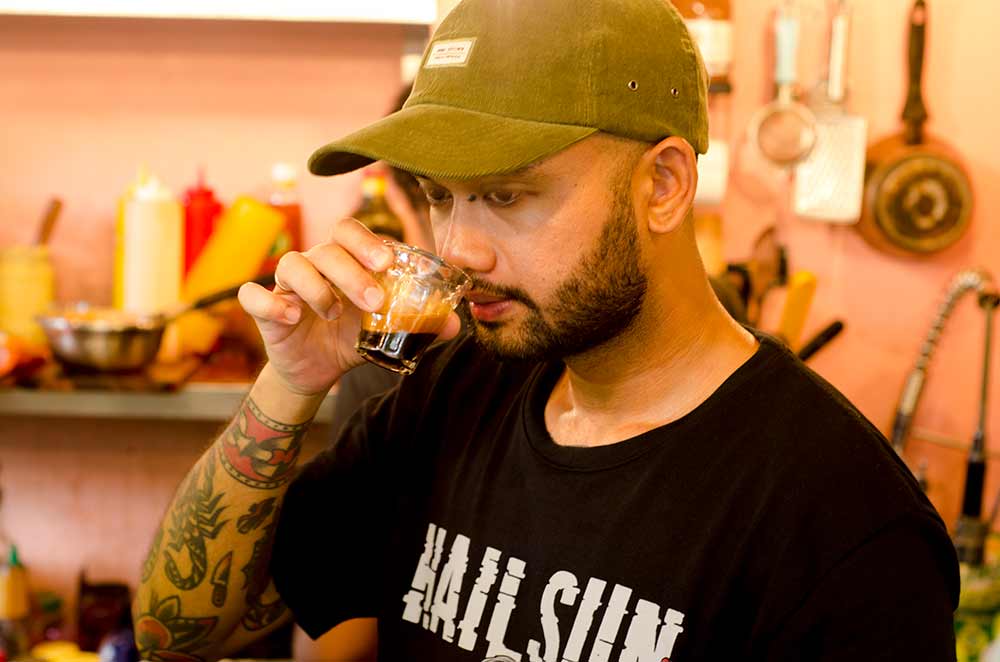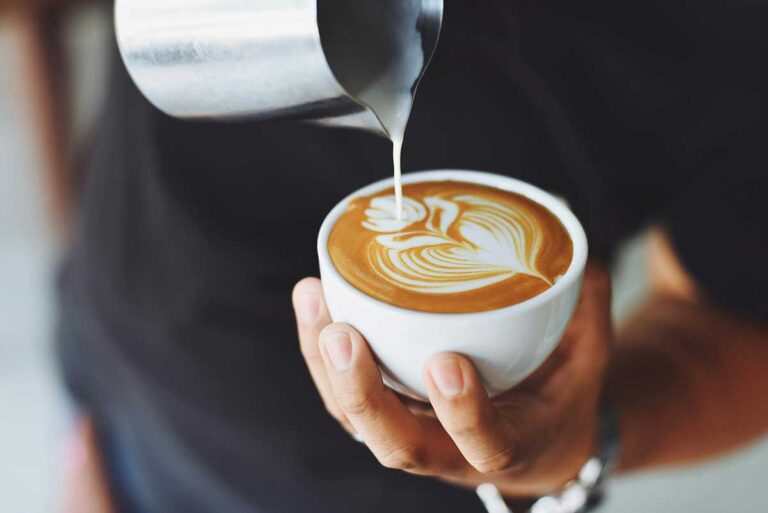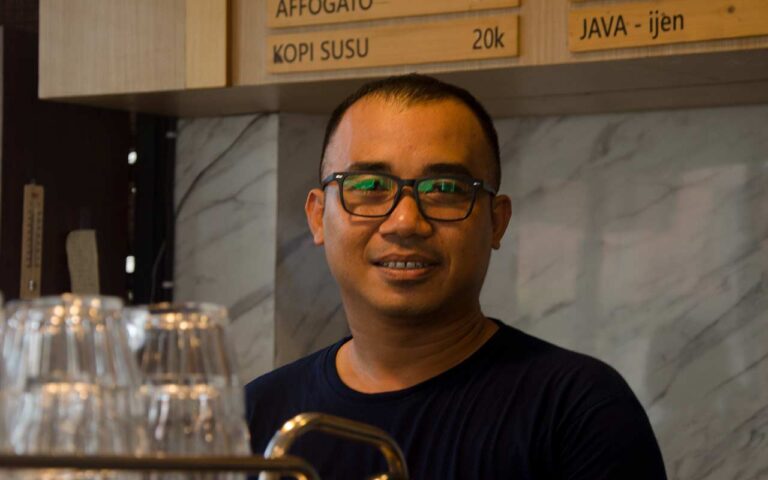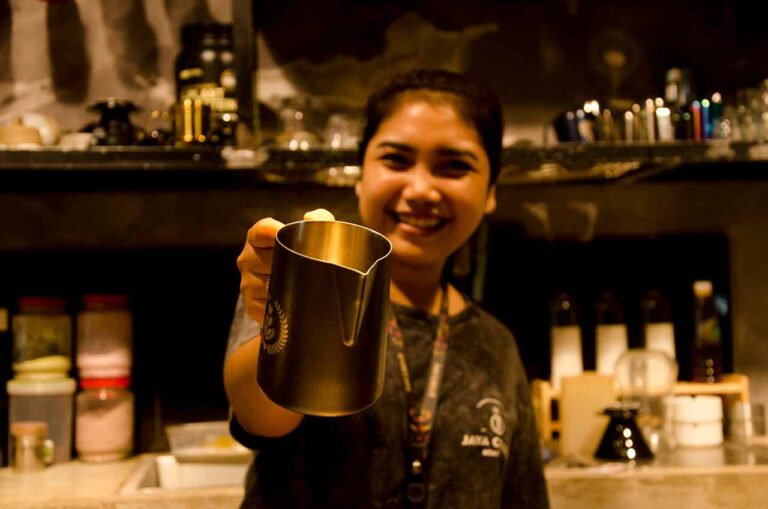Jisnu, this thousand-armed barista, is like working in the cockpit of an airplane; narrow but crammed with equipment on all sides; left, right, front, back, top, and bottom.
In a room measuring about 4 square meters, he is surrounded by various pieces of equipment. There is an espresso machine, coffee grinder, pastry display rack, juicer, cash register, and various kitchen sets on the bottom and top sides. That’s the bar and kitchen space of Monkey Cave Espresso, a small coffee shop at the corner of Monkey Forest Road, Ubud, Bali.
His full name is Anak Agung Gede Jisnu Anindya’s. He tugged at the collar of his t-shirt, swishing it around, opening an outlet for the hot air that was smothering his sweaty body. The room’s not-too-high ceiling enhances the sultry atmosphere with dozens of incandescent light bulbs hanging from strands of wire, making the bar room look like a chicken egg hatching cube.
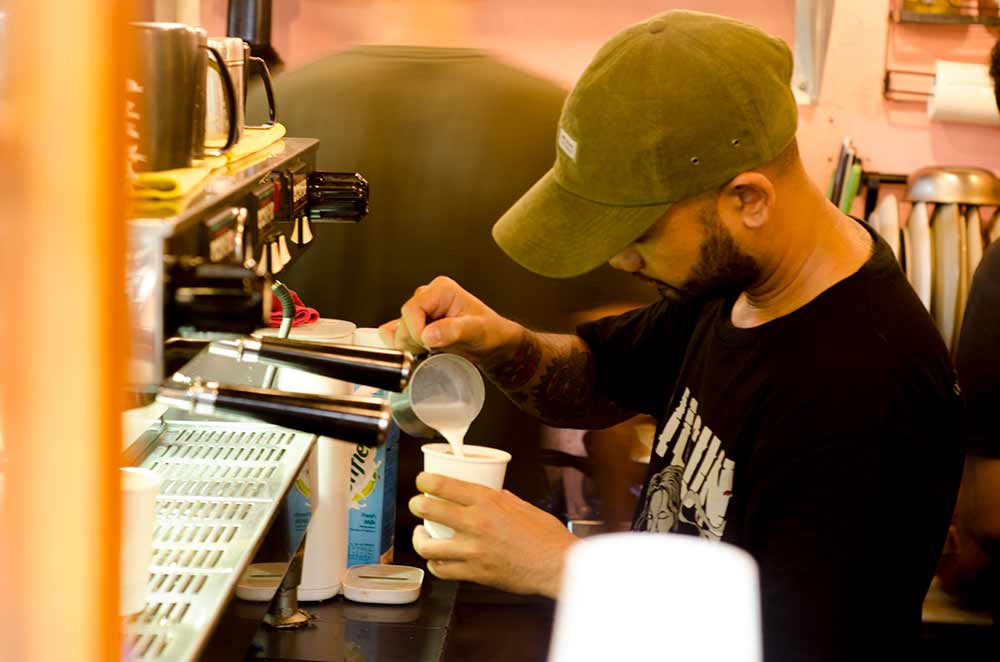
“This is how work feels like a cardio workout,” he said while laughing. But his hands were dexterous, as if they never stopped, grabbing whatever he needed from around him. It’s like he has a thousand hands.
Jisnu looked sweaty and hot, but he still looked happy working while making jokes at his two colleagues. Occasionally, he greets tourists passing by in front of the shop in a friendly manner with his fluent English.
“Only here the baristas are also good at cooking, as well as washing dirty plates and glasses,” he joked while busy grilling hot dog sausages ordered by customers. Hot air, accompanied by thin wisps of smoke, rushed out of the tiny cube room.
Jisnu moved swiftly. After preparing the hot dogs, he rushed to deliver them to the customers sitting on the terrace directly above the bar. A moment later, he was back at the bar, grinding coffee beans for a cappuccino order.
“The baristas here not only make coffee, but also handle the kitchen, cashier, even valet parking if necessary,” said the man, who was born on September 28, 1994, in a joking manner, while stomping the dozer coffee grinder to fill the porta filter with coffee powder.
But his statement about the large range of work that must be handled does not seem to be a complaint. Jisnu really likes a work pattern that can cover almost everything in the coffee shop where he works.
“For me, mastering many things can further complement my skills as a barista and have added value,” he said.
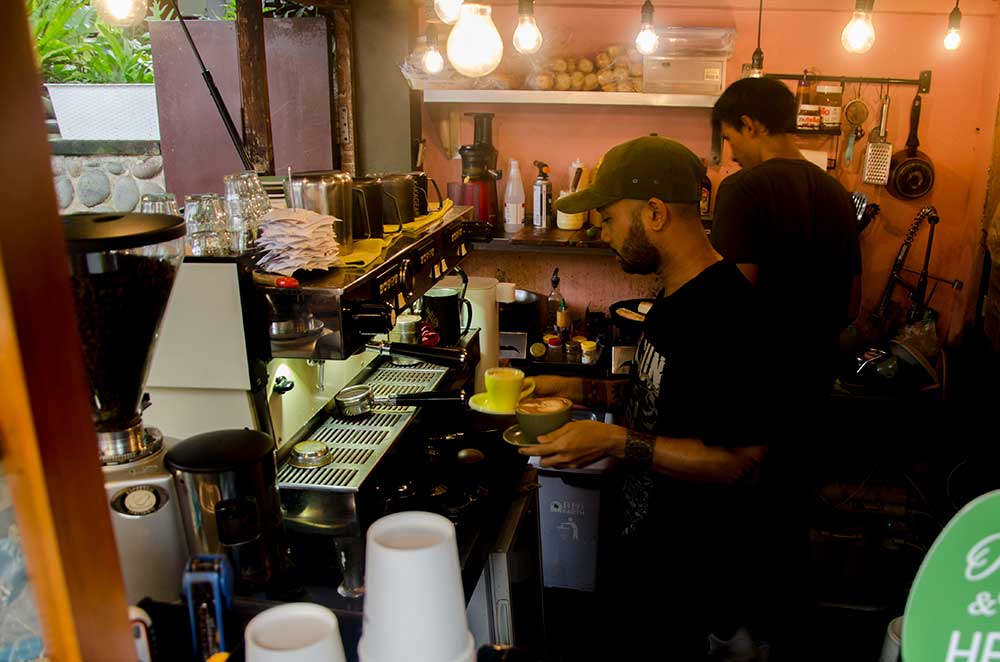
Socializing with coffee activists in Ubud also adds insight into the world of coffee. Jisnu was part of several coffee and barista communities in Ubud and Bangli. There, he was able to exchange experiences with other baristas who worked in coffee shops in Ubud.
But it seems like there aren’t many whose work patterns are similar to Jisnu’s. Most baristas are only tasked with making coffee.
In this way, the barista community can become a place to fill each other’s spaces with experience and insight.
“Actually, the coffee community in Ubud and Bangli was fun at first. “But when it started to only be used as a stage for certain personnel to perform, it felt unfair and no longer fun,” he complained.
Jisnu barista Ubud dreams of a coffee and barista community that has a clearer vision and builds a spirit of growth together. Because he experienced the fun of being in a coffee community, which helped him learn more about coffee.
“Even though Starbucks didn’t sell manual brew coffee in 2016, I won 3rd place in the V60 brewing coffee competition at the Bali Coffee Festival in Denpasar,” said the former barista of a coffee shop chain from the United States. The barista community is a place to learn.
Jisnu was not a beginner barista who only worked on the espresso machine and latte art. He has a desire to know more about not just his job as a barista, but also how a coffee shop operates.
He started learning to be a barista while working at Starbucks in mid-2015 as a “New Green Beans” level staff member who was identified by wearing a green apron. Mentored by a senior barista, in the first month, this young barista was able to make a standard Starbucks cup of coffee.
At Starbucks, he learned a lot about how to serve customers and the career paths of baristas. Knowledge that he did not get while studying at the Tourism College, majoring in Hospitality and FNB Services.
Armed with comprehensive knowledge and experience regarding the coffee shop business, Jisnu already has the skills to be able to open his own cafe business.
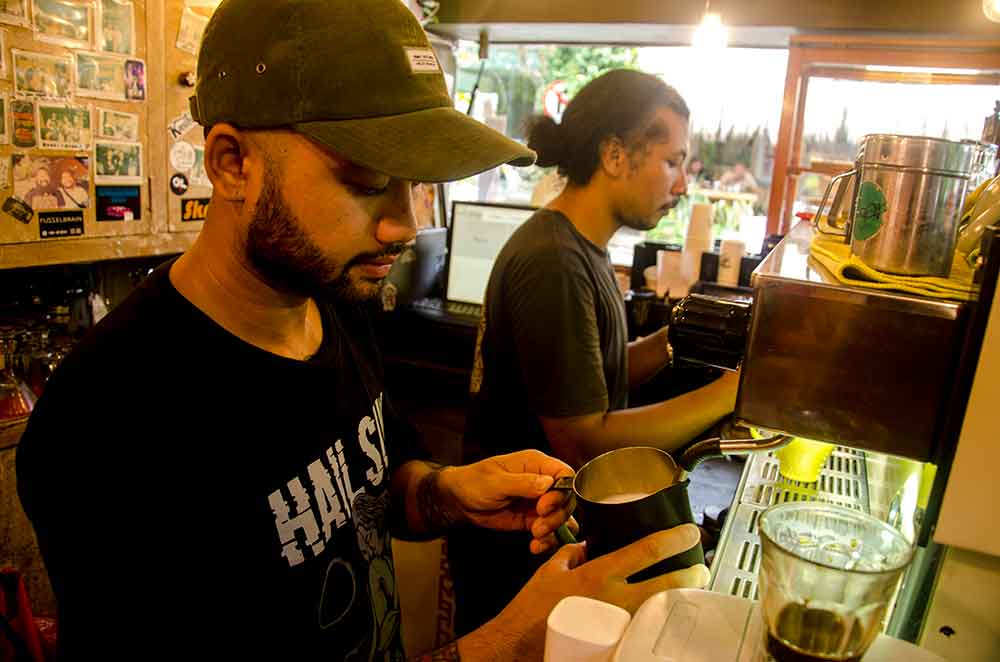
It started with the COVID-19 pandemic, which forced him to stop working as a barista at a well-known coffee shop in Ubud. As the tourism business collapsed, so did the accompanying businesses, including coffee shops.
However, his skills as a barista at Starbucks since 2015 still give him the opportunity to work in coffee shops that are still determined to run their business in a pandemic situation. One of them is Paperhills in the Penelokan area, Kintamani.
“I was involved in the opening team for Paperhills, a new coffee shop in Kintamani,” he said. However, Jisnu didn’t work there for long. He got into an accident, fell from his motorcycle, and was forced to stop working and rest to recover.
A month into his recovery period, Jisnu was offered to become a trainer at a barista workshop in Bandung, West Java, organized by the Job Training Institute (LPK).
There, he met many coffee shop entrepreneurs who were happy to exchange experiences. From there, he was inspired to open his own coffee shop at the end of 2021.
“I was determined to open a coffee shop in Bangli, renting my uncle’s kiosk for IDR 500 thousand per month,” he said.
Together with his younger sister, he named his coffee shop “Brewart Coffee.” Because a coffee shop for Jisnu is not just about selling coffee drinks, but also about the art of managing coffee-making skills and the courage to make a new life choice: becoming an entrepreneur.
Jisnu was really brave because the location of his coffee shop was not in the center of a busy tourist area. Moreover, during the COVID-19 pandemic, most people prioritized shopping for food over coffee.
“My capital is only IDR 14 million; I also happen to have several pieces of coffee equipment, so it’s enough to open a coffee shop,” he said.
His habit of handling a lot of work while working as a barista makes it easier for him to manage his own coffee shop. He really knows what is important and what needs to be maintained so that the café’s operations run effectively and continue to satisfy customers.
For the first month, Jisnu and his younger siblings had to work 14 hours a day to run Brewart Coffee. However, it didn’t take long; they were able to pay their employees, and the business ran as expected.
“I have been able to increase my rent to Rp. 700,000 per month while employing 5 employees,” he said proudly, showing his intention to share the profits with his uncle, the kiosk owner.
In fact, Jisnu still finds time to work as a professional barista at the Monkey Cave Espresso Shop.
The end of the COVID-19 pandemic has made the coffee shop business even more successful. Jisnu has transformed his coffee shop into a venue for various activities for young people.
As the drummer for the hard metal band “Beringas,” he invited several bands he knew to perform at his coffee shop. Several youth communities are starting to carry out more activities at Brewart Coffee.
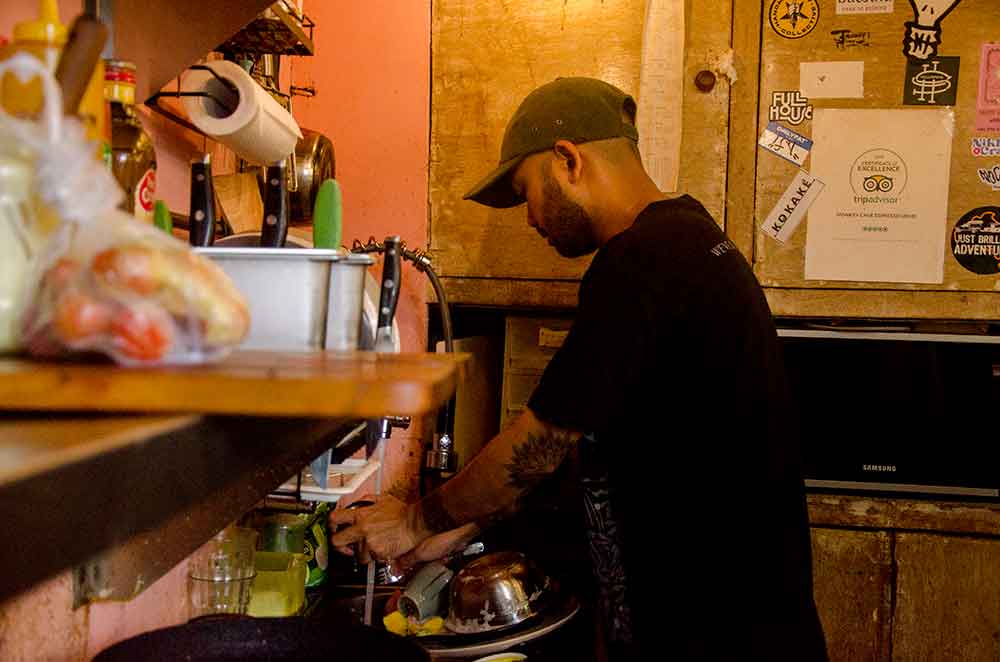
However, business is not always smooth. New challenges can arise at any time and must be faced. The kiosk owner increased the rental price to IDR 2 million per month. No haggling.
Jisnu calculates the cash flow of his coffee shop. The rental cost of that amount is not enough to survive. With a broken heart, Jisnu decided to close the Brewart Coffee Shop.
“My wife cried almost every night because she had to terminate the employment of 5 employees, who were like her own family,” he said, recalling one of those tough moments.
Jisnu was quite traumatized by that incident. Being forced to lose a passionate employee apparently leaves enough pain. There was a feeling of sadness considering that 5 employees lost their jobs because he closed his coffee shop.
However, Jisnu slowly began to regain his enthusiasm. He is determined to start building a new coffee shop business again. In fact, several friends have invited him to collaborate on joint venture capital.
“Now we are in the process of setting up a new coffee shop in a location not far from the previous one,” he said happily.
He plans to have his new coffee shop running soon. Because the skills, knowledge, and experience are quite complete.
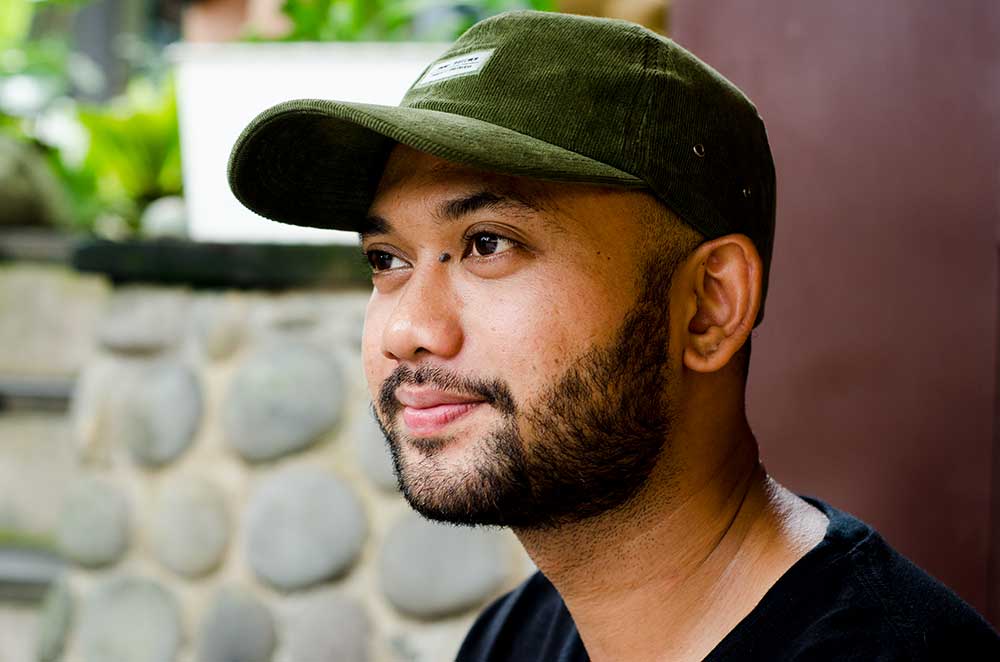
Jisnu lives his profession as a barista with a vision that continues to develop. By undergoing various work patterns, he instinctively learned while practicing directly managing a coffee shop.
Jisnu Barista Ubud still doesn’t seem to have eased up on his busy working day. His hands seemed to be pecking at everything around him. This time he shifted quickly to the front; his fingers were on the cashier’s computer keyboard, tidying up the customer who was paying for his coffee order.
Becoming a barista is the starting point of a long road full of twists and turns to the wider world of coffee. Jisnu Barista Ubud, chose to train himself with everything he could learn and do with his thousand hands.
Follow Jisnu Barista Ubud on his social media accounts:
Instagram: @nugi.bali
YouTube: @jisnuanindya

